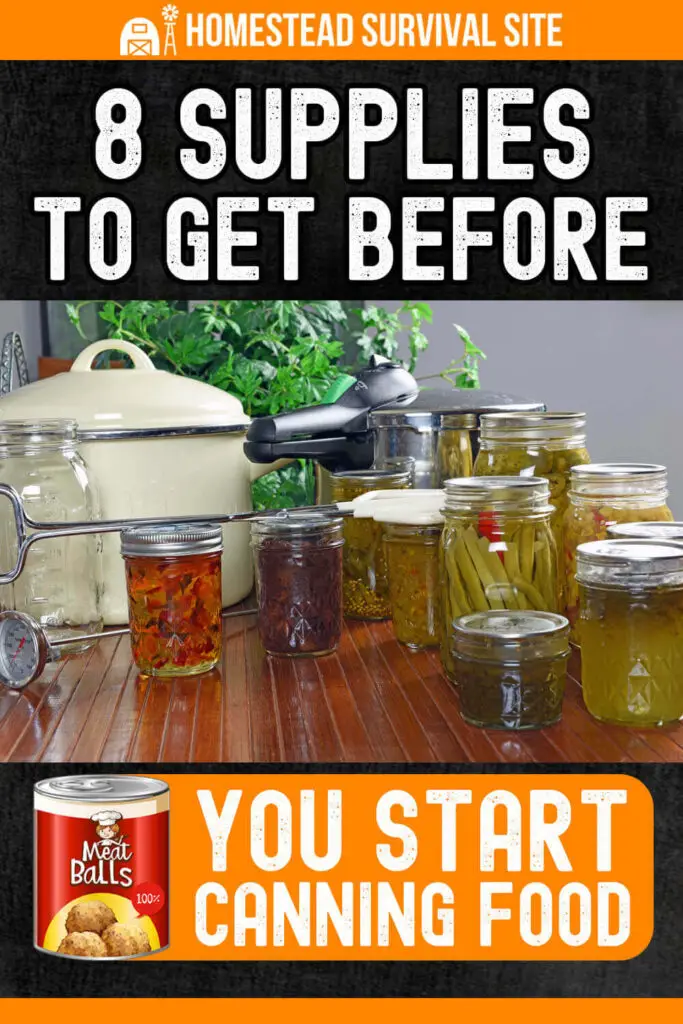Estimated reading time: 6 minutes
What do you do when the local shops have been looted, when your crops have been destroyed by climate change, or when a mudslide has left you cut off from access to a supermarket? Easy. You turn to your fully stocked pantry of canned foods–the one you've been adding to throughout the year.
When properly sealed and stored, canned fruit and salsa have a shelf life of up to 18 months, pickled veggies have a shelf life of up to two years, and jams can last even further than the two-year mark (although they may start to lose a bit of flavor).
The point is, canning your food at home isn’t just a fun hobby; it’s an insurance policy to fall back on if the world tips upside down.
You don’t need a huge factory operation to get started. In fact, everything you need to start canning at home is easily available at your local hardware store or online.
Want to save this post for later? Click Here to Pin It on Pinterest!
Follow along as we list the most essential items to start canning food at home.
Canning Jars and Lids
For pickling, preserving, and storing–glass jars are the way to go!
- Mason jars are the most common and readily available jars out there when it comes to canning. There are two types of Mason jars you will find: regular mouth and wide mouth.
Regular mouth Mason jars are smaller in comparison to wide mouth jars while ranging in size from 4oz (quarter pint) to 32oz (quart). These jars are ideal for pourable liquids such as soup or salsa and also jams which tend to be made in smaller batches. These compact sizes are convenient to store and organize.
Wide mouth Mason jars are much larger with the biggest size measuring up to a half-gallon. Their wide mouth and large size make canning whole vegetables or cuts of meat a lot easier and less messy. Many people find wide mouth Mason jars much easier to clean as well.
Most often, the mason jars you purchase will come packaged with their own lids. The lids are a two-piece set comprised of a flexible metal top that is sealed on in a hot water bath and a screw-style lid that keeps the sealed lid in place. Once in a while, you’ll find that the lids are sold separately, so just be sure to double check that you’ve got both the jars and the lids before you check out.
You can pick and choose your jar size and style based on what you’re canning. There is no ‘right’ or ‘wrong’ when it comes to the jars you choose. Some people prefer to use wide mouth jars for every product and some choose to can their food in a more methodical manner.
Pro Tip: If freezing your jar, leave a little headroom for expansion which will reduce the chances of your jar breaking.
Canning Tools
When dealing with boiling water and hot metal lids, some tools are absolutely necessary while canning food at home, and some tools just make the process a little bit easier.
- Water Bath Canner – This large kettle is specifically made for canning. It comes with a canning rack which not only stabilizes your cans during the sealing process but also prevents them from cracking while resting on the bottom of the pot.
- Bubble Popper – Before sealing up your can, you need to get rid of the little air bubbles hiding in your food. You can use a chopstick, cocktail stir stick, or purchase an official bubble popper to release any trapped air.
- Lifter – While you could use a pair of household tongs, these rubber-coated Jar Lifters make lifting the jars out of the hot water bath much easier and safer.
- A Wide-Mouth Funnel – Transferring hot liquids and sticky syrups is just so much easier when you have a funnel to help you out. These funnels have a wide opening at both ends to accommodate all sorts of food. Stainless steel is your best bet when it comes to a funnel, as it won’t wear over time with so much exposure to heat.
- Dutch Oven or Large Stock Pot – When it comes to jams, soups, and sauces, you really want to boil out any excess liquid. Although this may be considered more as part of the cooking process, it has a big effect on the shelf life of your canned food.
- Kitchen Timer – Of course, you can use a wall clock, wristwatch, or your phone to keep track of time, but let’s be honest…that never works! Make your job a little easier with a kitchen timer to be sure the cooking and sealing process goes smoothly.
- Magnetic Lid Lifter – If you are a super fancy canner, this tool will make your job seem glamorous. You can use the magnet to lift and place lids on your cans to avoid burns and keep the process sterile.
You can purchase the whole kit and caboodle online, including the water bath canner, tour your local hardware store, or make do with tools and pots from around the house.
Some Extra Supplies
- A Friend or Helper – Canning can be a long process and certainly involves many steps. Ask your family members or prepping buddies to join you in a day of canning.
- Time – When you have all the time in the world, canning is enjoyable and even therapeutic. But when you find yourself in a time-crunch, it can be stressful and your finished product might end up being a little wonky.
- Canning Cookbook – You’d be surprised by all of the foods you can can! A canning cookbook will take you beyond pickled cucumbers into the land of variety and flavor.
Remember; if you’re in a pinch, you only really need three items to can. However, the other canning supplies on our list really make canning food at home an enjoyable, efficient, and safe process. Don’t forget to enjoy some of the fruits (or veggies) of your labor by opening a jar of pickles once in a while. There doesn’t have to be a disaster outside your doorstep for this hobby to pay off.
Like this post? Don't forget to Pin It on Pinterest!











